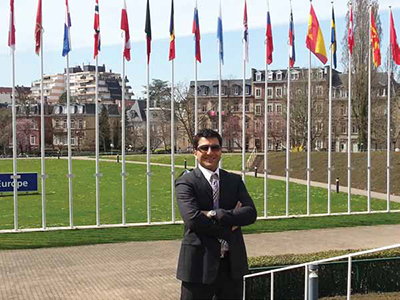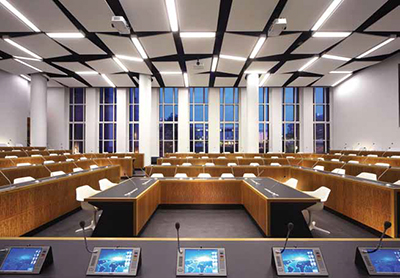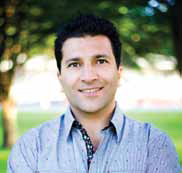Quick Bio

NAME: Fardad Zabetian
TITLE: CEO
COMPANY: Media Vision USA
OVERTIME: Growing up in Iran, Zabetian experienced restrictions in communication with the outside world, and set out to help individuals of different cultures better understand each other.
SCN: At what point did you realize that you were destined for a career in technology?
Fardad Zabetian: Quite typically, my parents were pushing me to choose a career in medicine. However, while supporting my aunt at hospitals in Tehran, I felt more drawn toward medical devices than actual healthcare. I wanted to understand how technology supports human activities as a whole. My interest was beyond industries and beyond borders, so that’s when I decided to move forward with a career in communication technology, starting with computer communications studies.
Zabetian’s international experience has made him very flexible to new ideas and eager to adopt new technologies. Meda Vision USA has just obtained TAIDEN distribution in the U.K. and Switzerland.SCN: Your undergrad work was in computer communications, and your Master’s is in engineering. How did you arrive in the field of conferencing and interpretation?

FZ: In 1997, I travelled to Germany and attended the CeBIT Expo. It was my first trip outside of Iran. Not speaking much German, I walked in on the first day and saw a company providing language interpretation solutions. That was the moment of destiny that you were asking me about; there was something about the way everything unfolded. Growing up in a distressed country, experiencing restrictions in communication with the outside world, I had finally uncovered a technology solution that would support cross-border communication and help individuals of different cultures better understand each other. Back to Iran, I began distributing conferencing and language interpretation solutions and I started Media Vision USA with the same focus when I moved to the United States. Now, I have over 16 years in the industry.
SCN: What changes have you seen in the U.S. conferencing market since 2002, when you founded Media Vision USA?
FZ: In the past 10 years, I have seen a tremendous growth in the acceptance of conferencing systems as a solution to day-to-day audio intelligibility issues in meeting environments, especially when it comes to teleconferencing. Users are a lot more knowledgeable on the technology and the benefits of using conferencing microphones versus traditional mics with mixers and ceiling speakers. When I look back just five years ago, purchasers were mostly international organizations and governmental agencies. Today, the majority of our business is done with corporate users and education facilities. It’s a major switch. This took a lot of education efforts from the Media Vision team and from our dear competitors in the U.S. market.
A recent installation of a multimedia conferencing system at the University of Montreal.SCN: How has your international experience with conferencing informed the services and technologies you bring to market?

FZ: Your question makes me think of one evening: following a show day at Prolight + Sound. I did a phone interview with an engineer located in the U.K. while drinking German beer in Frankfurt with my new Swiss colleague who was smoking a Cuban cigar. We are all actors in this globally integrated world. My international experience helped me grasp the extent of the concept quicker and more fully. It also made me very flexible to new ideas and fast to adopt new technologies. Recently, we started manufacturing Attend, the first solution for multilingual remote participation as an addition to conferencing systems. Today, international organizations are very keen to learn more but soon other industries, especially government and multinational corporations will understand the major benefits and costsavings resulting from the technology. My international experience helps Media Vision be an early adopter and this is the key to our success.
SCN: What new demands will be placed on conferencing and interpretation technology in the next five years?
FZ: Same as for many other technologies, there is a high probability that conferencing will move toward the BYOD moving in that direction; however, quality and reliability will remain our main focus over accessibility. You can rely on machine-based translation technology at the consumer level for instance if you travel abroad looking for a suggestion for a restaurant or to use a coupon deal, but we don’t see that two corporate executives working on a cross-border merger will be able to move away from interpreters any time soon. The human touch will remain the core of our business for a while.
Kirsten Nelson is the editor of SCN.
